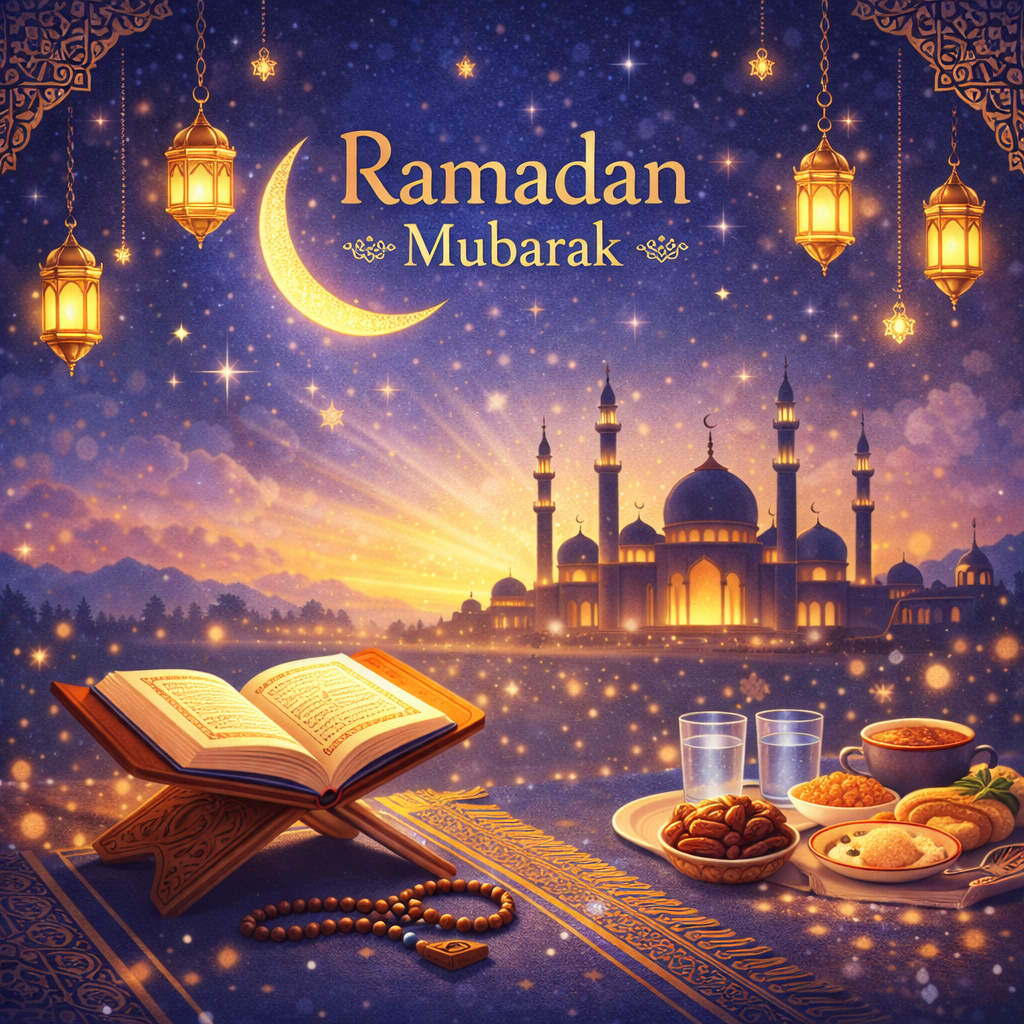Ramadan 2026: Meaning, Fasting Rules, and Eid Celebration
Ramadan 2026 is the ninth month of the Islamic lunar calendar and marks the period when the Quran was first revealed to Prophet Muhammad (PBUH). Muslims observe fasting from dawn to sunset to practice self-discipline, reflection, and compassion. The holy month concludes with Eid al-Fitr, a joyful festival celebrated with prayers, family gatherings, and gratitude.

What is Ramadan?
Ramadan is the ninth month of the Islamic lunar calendar and holds immense spiritual importance for Muslims worldwide. It is believed to be the month in which the Quran was first revealed to Prophet Muhammad (peace be upon him). During Ramadan, Muslims observe fasting (Sawm), prayer, self-reflection, and charity to strengthen their faith and develop empathy for the less fortunate.
When is Ramadan 2026?
Ramadan 2026 is expected to begin around Tuesday, 17 February 2026, and end around Thursday, 19 March 2026, depending on moon sighting.
Ramadan 2026 Key Dates (Expected)
Ramadan dates may vary by country based on Saudi Arabia moon sighting or local Islamic authorities.
Ramadan 2026 in India
In India, Ramadan 2026 is also expected to begin on 17 February 2026, subject to regional moon sighting.
Ramadan 2026 date in India: 17 Feb – 19 Mar (expected)
Ramadan 2026 timetable India: Varies by city
Ramadan 2026 Calendar & Timetable
The Ramadan calendar 2026 provides daily fasting timings for Sehri (Suhoor) and Iftar.
Ramadan Timetable 2026 (Sample – India)
Always check your local Ramadan timetable 2026 for accurate timings.
Ramadan in Saudi Arabia 2026 & Moon Sighting
Ramadan in Saudi Arabia 2026 plays a key role in determining global dates.
Saudi Arabia Ramadan moon sighting is widely followed
Official confirmation comes from the Supreme Court of Saudi Arabia
Ramadan Fasting Rules (Sawm)
Sawm, or fasting, is one of the Five Pillars of Islam.
During Ramadan:
Fasting is observed from dawn (Sehri) to sunset (Iftar)
Muslims abstain from food, drink, smoking, and negative behavior
The fast is broken at sunset, traditionally with dates
Who is Exempt From Fasting?
Children
Elderly
Sick individuals
Pregnant or breastfeeding women
Travelers
Why is Ramadan Important?
Ramadan is a time for:
Spiritual purification
Self-discipline
Increased prayer and Quran recitation
Charity and generosity
The last ten nights are especially sacred, with Laylat al-Qadr being the holiest night of the year.
Eid al-Fitr 2026
Eid al-Fitr 2026 marks the end of Ramadan and the beginning of Shawwal.
Expected around 19–20 March 2026
Begins after moon sighting
Celebrated with prayers, feasting, charity, and family gatherings
Ramadan Wishes & Greetings
Ramadan Mubarak Wishes
Ramadan Mubarak 2026! May this holy month bring peace and blessings.
Wishing you faith, patience, and prosperity this Ramadan.
Happy Ramadan Wishes
Happy Ramadan! May Allah bless you and your family.
Happy Ramadan Mubarak wishes filled with joy and gratitude.
Ramadan Quotes
“Ramadan is not just about fasting, it is about feeding the soul.”
“Fasting during Ramadan strengthens patience, gratitude, and faith.”
Health Benefits of Ramadan Fasting
Scientific studies associate fasting with:
Improved metabolism
Better heart health
Detoxification
Appetite control
Stronger immunity
Ramadan Countdown 2026
As Ramadan approaches, many people follow a Ramadan countdown to prepare spiritually and mentally for the holy month.
Conclusion
Ramadan 2026 is a time of faith, reflection, discipline, and compassion. From fasting and prayer to charity and Eid celebrations, Ramadan strengthens community bonds and spiritual growth.
Vedantu wishes all Muslim friends, students, and families a blessed Ramadan and a joyful Eid al-Fitr. Ramadan Mubarak 2026.
FAQs on Ramadan 2026: Date, Calendar, Timetable, History, Fasting Rules, Wishes
1. When is Ramadan 2026?
Ramadan 2026 is expected to begin on the evening of 17 February 2026, with the first fast (Roza) observed on 18 February 2026, subject to moon sighting.
2. What is the Ramadan 2026 date in India?
In India, Ramadan 2026 is likely to start on 18 February 2026, depending on local moon sighting announcements.
3. How long is Ramadan 2026?
Ramadan 2026 will last 29 or 30 days, depending on when the crescent moon is sighted.
4. When does Ramadan 2026 end?
Ramadan 2026 is expected to end around 19 March 2026, followed by the celebration of Eid al-Fitr.
5. When is Eid al-Fitr 2026 after Ramadan?
Eid al-Fitr 2026 is expected to be celebrated on 19 or 20 March 2026, subject to moon sighting.
6. What are the fasting timings during Ramadan 2026?
During Ramadan 2026, fasting begins at dawn (Fajr) with Sehri and ends at sunset (Maghrib) with Iftar. Timings vary by location.
7. Why do Ramadan dates change every year?
Ramadan follows the Islamic lunar calendar, which is about 10–11 days shorter than the Gregorian calendar, causing Ramadan dates to shift earlier each year.
8. What is Laylat al-Qadr in Ramadan 2026?
Laylat al-Qadr is the holiest night of Ramadan and occurs during the last 10 odd nights, with the 27th night expected around 14–15 March 2026.
9. Is moon sighting important for Ramadan 2026?
Yes, the official start and end of Ramadan depend on crescent moon sighting, especially announcements from Saudi Arabia and local authorities.
10. What does Ramadan Mubarak mean?
“Ramadan Mubarak” is a greeting that means “Blessed Ramadan”, used to wish peace, faith, and blessings during the holy month.







